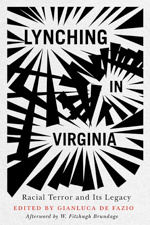Today, we are happy to bring you our conversation with Gianluca De Fazio, editor of Lynching in Virginia: Racial Terror and Its Legacy
What inspired you to edit this volume?
Since 2017, I worked with my senior seminar students to build a digital project, Racial Terror: Lynching in Virginia, that aims to tell the oft-forgotten stories of the people lynched in Virginia from the end of the Civil War until the 1930s. The inspiration behind this book was to share some of these stories with communities across Virginia. While there have been several local initiatives to remember the victims of lynching, many cities and towns still have much to learn, and reckon with, regarding their past of racial violence. Moreover, I wanted this book to be a forum where a variety of voices and perspectives, both from inside and outside of academia, had the opportunity to discuss the meaning of these stories.
What did you learn and what are you hoping readers will learn from your book?
I hope that readers will learn not just about individual stories, but also how much the legal and political apparatus in Virginia shaped lynching and racial terror. We often think of mob violence as something that is far removed from the halls of power; in reality, governors, legislators, mayors, police, coroners and even newspapers had a key role in instigating, or, at the very least, condoning this violence. Every time a lynching took place in Virginia, this was a form of state-sanctioned terror to intimidate the black population, as public officials did little to prevent or punish this violence. When authorities decisively acted to curb mob violence, it is no surprise that lynchings (but not racist violence) disappeared.
What surprised you the most in the process of writing your book?
Throughout the book there are several examples of people rebelling and protesting against lynching and mob violence. While lynchers often justified their action by claiming that they were executing the will of the people, this was simply not the case. The black press, especially John Mitchell, Jr. and his newspaper the Richmond Planet, incessantly denounced lynching and exhorted authorities to curb and punish mob violence. Black Virginians would sometimes protest lynchings by boycotting white stores and farmers, or refusing to get the remains of their relatives who had been lynched. And, in several cases, white sheriffs would confront the mob to prevent lynchings, sometimes by using deadly force. While lynching and the threat of mob violence was pervasive in Virginia, there was plenty of resistance to it as well.
Is there a particular anecdote from your book you would like to spotlight?
I open the book by describing the 1899 lynching of Benjamin Thomas, a black teenager accused of assaulting a white girl in Alexandria. What is remarkable about this horrific act of mob violence is that the local black population tried to protect the jail where Thomas was held, correctly fearing that a white lynch mob would be ready to kill him. Rather than fortifying the jail to protect it from the mob, local authorities instead arrested the black folks that had offered to help the police to defend Thomas and the rule of law. It was a grotesque example of how white authorities could punish every black person that would challenge white supremacy, even as they were trying to defy lawlessness and mob rule.
What’s next?
I have a new research project underway that documents recent efforts by activists, communities, organizations, and institutions to revive the collective memory of lynching and racial terror across the country. In particular, I have recently released a new digital project Memorializing Racial Terror: Lynching Markers in the United States that catalogs and maps all the historical markers dedicated to the victims of lynching in the United States. In a sense, this new project is an extension of this book, as memorializing lynching victims with historical markers is one avenue our communities have to address the collective amnesia we tend to suffer about past lynchings and their legacy today.





